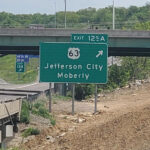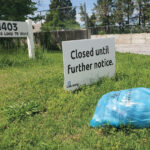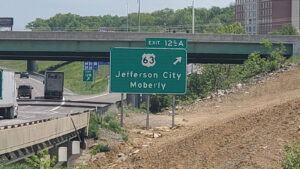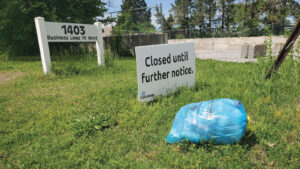Airbnb and similar rentals are a hot-button issue in Columbia.
Columbia’s Planning and Zoning Commission, Columbia City Council, short-term rental operators, and residents continue to debate whether the city should adopt ordinances to regulate the short-term rental industry in Columbia.
“I don’t envision there’s a perfect solution, otherwise we would have done it,” says Mayor Barbara Buffaloe. “We need to come to a compromise because we’ve been in this grey area for over five years.”
While the COVID-19 pandemic tabled the discussion about short-term rentals for nearly two years, the city took steps to solicit input from the community late last year.
“The city council had a joint work session with the planning and zoning commission in December 2022 about potential regulations for short-term rentals and we asked them to survey the community on the potential regulations,” Barbara says. “Next steps will be another work session with council and the planning and zoning commission, most likely in late June or July.”
WHAT’S THE CONTROVERSY?
According to the city of Columbia, a short-term rental is defined as “a dwelling unit rented out for a short period of time either informally or via an online platform/website including, but not limited to, Airbnb.com or VRBO.com.”
Long-term rentals, which are units rented for more than 31 consecutive days under a rental contract, are not affected by the proposed ordinance.
While the regulatory standards drafted by the P&Z commission define criteria that would need to be met in order for a property owner or tenant to legally license a dwelling as a short-term rental, the proposed ordinance would also establish permitted locations, or zoning districts, where short-term rentals are permitted. As proposed, the ordinance would prohibit owners who do not live in the dwelling from operating a short-term rental in residential-zoned neighborhoods for more than 30 days per year. Short-term rentals would be permitted in commercial areas.
“Currently, a short-term rental operating in a residential zone is considered to be a commercial use,” Barbara says.
Some who own and rent homes in residential neighborhoods say that effectively puts them out of business.
“They are calling it a regulation but it would eliminate over 90 percent of the short-term rentals in town,” says Patrick McCollum, a Columbia resident who owns three short-term rentals and two long-term rental units in the city. “There would be no full-time short-term rentals in any residential neighborhoods. That’s putting us out of business, not regulation.”
RESIDENTS SPEAK
Survey results reveal that of 432 respondents, 63 percent do not support limitations on the location of short-term rentals, while 37 percent of respondents do support limitations. The majority of respondents — 59 percent — did support standards related to registration of short-term rentals, like business licenses, payment of lodging taxes, and inspections to ensure that health and safety standards are being met.
Barbara says the planning and zoning commission has conducted a review identifying where short-term rental units are located in Columbia.
“Based on their presentation to council in December, the majority appear to be located in the First Ward,” she says. “Residential properties in the First Ward are centrally located — and within walking distance — to a number of neighborhood commercial and business uses, which makes them ideal for individuals who utilize alternative modes of transportation to obtain goods and services.”
The affordability of residential housing in highly desired locations can be negatively affected when it is required to compete with commercial use, such as short-term rentals, Barbara adds.
Of the 32 respondents from the First Ward, 53 percent did not support limitations on the location of short-term rentals, while 47 percent were in favor of limitations regarding location. Nearly two-thirds of the 87 short-term rental owners who responded to the survey said they support the preservation of affordable housing, whether owner-occupied or rental, within the city.
OPEN TO DISCUSSION
Jessie Yankee, who owns two short-term rentals in Columbia, including the historic “hobbit house” on the corner of Ash and West Boulevard, and co-hosts another property, says she does think there is a perfect solution — if all sides could sit together at the table for a discussion.
“I would love the opportunity for a work session,” Jessie says. “Let’s sit down with the mayor, the planning and zoning commission, and the council and have a guided conversation. I think we could leave with a reasonable set of regulations. We agree that there need to be regulations that need to be written and approved, but not the regulations as they exist. We want to have a voice in whatever the next step would be.”
Patrick echoes Jessie’s belief that there is a solution that could protect the interest of all sides, and many of those pieces are already in place for long-term rentals in the city.
“I don’t think it’s a tough solution to make all sides happy,” he says. “I think it could be done fairly easily.”
Because two of his units are long-term rentals, Patrick says he is already registered with the city, and his properties are inspected as rental properties.
While short-term rental owners are open to registration and inspections, holding short-term rentals to the same standards as a hotel or motel, as the ordinance proposes, is like comparing apples and oranges, Jessie says.
“Hotels are serving a very different demographic,” she says. “Their kitchens have to pass safety checks like a restaurant would, and in a home, that isn’t necessary. Just inspect us like a regular rental unit. Why should the inspection be different for a place you’re going to stay for 29 versus 31 nights?”
SUPPORTING GROWTH
While short-term rental owners like Jessie and Patrick understand the need for additional affordable housing in Columbia, they say their short-term rental business helps keep rent in their long-term units affordable.
‘We are able to keep the rent down for the long-term rentals because we have the rent from the short-term rentals,” Patrick says. “If the short-term rentals went away, rent would go up in the long-term units.”
While many cities see short-term rentals being operated by out-of-state investors, that isn’t the case for Columbia’s nearly 400 short-term rental properties.
“Columbia is lucky because the short-term rental owners are all very invested in the health and vibrancy of Columbia,” Jessie says. “This isn’t a situation where you have a bunch of out-of-state owners. We want to see the city be awesome.”
ROOM FOR BOTH HOTELS AND SHORT-TERM RENTALS
Barbara says the city collects a 5 percent lodging tax on stays at hotels, inns, and motels. The tax is not currently collected from stays at short-term rentals.
Short-term rental owners do currently collect taxes from renters, and Patrick says they are not opposed to collecting lodging tax as well, a cost that would be passed along to the renters.
“The city could collect tax revenue, and I think there is quite a bit of revenue to be had,” he says.
As the city seeks to increase tourism and commerce, Jessie says that short-term rentals are a vital piece of the lodging puzzle in Columbia, as the rentals often house traveling nurses, larger families, and other longer-term travelers to the area.
“This isn’t a hotel versus short-term rental issue, because we need both in Columbia,” Jessie says. “For Mizzou graduation, every Airbnb was sold out in Columbia a year ago, and every hotel room and Airbnb is already sold out for next year.”
As short-term rentals become even more popular among travelers, Patrick says he is delivering a service people want, while supporting the local economy.
“The guests we have are dedicated to this type of lodging; it is what they seek out,” he says. “We give them recommendations on where to go, what to eat, share information about the parks. We always send them to local places, and it’s a good thing for our city. Short-term rentals have become a common type of lodging that people like and seek out, and it would be a bad thing if the city eliminated them.”








